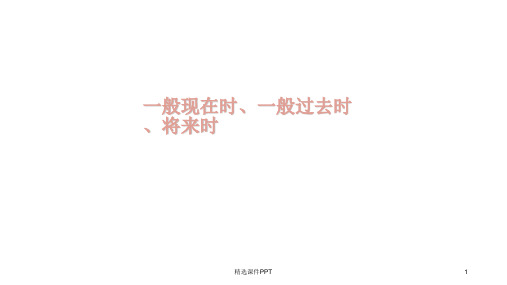中考一般过去时复习课件
合集下载
初中英语-中考时态复习-公开课精品课件-八大时态完整版

结构:do does 标志语:
often,always,usually,sometimes, every day/week/month/year...
习惯活动 现在情况 客观事实 主将从现
I get up at six every morning. They are very busy. He needs help.
当主语不是第三人称单数时:
• 肯定句 :主语+动词原形+其它 • 否定句 :主语+don't+动词原形+其它 • 一般疑问句: Do+主语+动词原形+其它 • 特殊疑问句:特殊疑问词+一般疑问句 注意★:句式结构错则全句都错。 • 谓语动词的形式:do/does • 助动词的形式:don't(do not)/doesn't(does not)
英语时态复习
初中阶段应掌握的时态共有八种:
一般现在时、一般过去时、一般将来时 现在进行时、现在完成时 过去进行时、过去将来时、过去完成时
在英语语法中,"时"指动作发生的时间,"态"指动作的样子和状态。
一般现在时 Present Simple
What does he/she often do? What do they often do?
肯定式 I work. You work. We work. They work. He works.
疑问式
否定式
疑问否定式
Do I work?
I don't work.
Don't I work?
Do you work? You don't work. Don't you work?
often,always,usually,sometimes, every day/week/month/year...
习惯活动 现在情况 客观事实 主将从现
I get up at six every morning. They are very busy. He needs help.
当主语不是第三人称单数时:
• 肯定句 :主语+动词原形+其它 • 否定句 :主语+don't+动词原形+其它 • 一般疑问句: Do+主语+动词原形+其它 • 特殊疑问句:特殊疑问词+一般疑问句 注意★:句式结构错则全句都错。 • 谓语动词的形式:do/does • 助动词的形式:don't(do not)/doesn't(does not)
英语时态复习
初中阶段应掌握的时态共有八种:
一般现在时、一般过去时、一般将来时 现在进行时、现在完成时 过去进行时、过去将来时、过去完成时
在英语语法中,"时"指动作发生的时间,"态"指动作的样子和状态。
一般现在时 Present Simple
What does he/she often do? What do they often do?
肯定式 I work. You work. We work. They work. He works.
疑问式
否定式
疑问否定式
Do I work?
I don't work.
Don't I work?
Do you work? You don't work. Don't you work?
初中英语中考复习时态讲解课件(共79张ppt)

一般现在时
1. 表示经常性或习惯性的动作
She does excersice everyday.
真题链接
—What do you often do at weekends?
—I often ____ my grandparents.
A. visit
B. visited
C. have visited D. will visit
Just a moment, I am washing dishes.
when
习题
Just a minute! My brother________ his car in the garden. A. washes B. is washing C. washed D. will wash
习题
---Hey, Tom. Let’s go swimming.
动词过去分词 不规则变化
speak hear see give build swim buy teach
spoken heard seen given built swum bought taught
现在完成时
already yet
1.过去发生或已完成的某一动作对现在的影响。
I have already watched this film. I haven't watched this film yet. I have already visited America. I haven't visited America yet.
A. prepares
B. is preparing
C. has prepared D. prepared
真题链接
--Mum, it's late. Why are you still here? --Dad hasn't come back yet. I ____ for him. A. am waitingB. was waiting C. waited D. had waited
2023年中考英语复习动词时态、语态 课件

He has been a League member for three years. (是团员的状态可持续)
He joined the League three years ago. ( 三年前入团,joined为短暂行为。)
I have finished my homework now. ---Will somebody go and get Dr. White? ---He's already been sent for.
I'd rather you came tomorrow.
4) wish, wonder, think, hope 等用过去时,作试探性 的询问、请求、建议等。如:
I thought you might have some. 我以为你想要一些。
比较:
一般过去时表示的动作或状态都已成为过去,现已 不复存在。
He is used to a vegetarian diet. Scarf is used to taking a walk.(现在习惯于散步)
典型例题
---- Your phone number again? I _A__ quite catch it. ---- It's 69568442. A. didn't B. couldn't C. don't D. can't
3) be +不定式表将来,按计划或正式安排将发 生的事。如:
We are to discuss the report next Saturday. 4) be about to +不定式,意为马上做某事。如:
He is about to leave for Beijing. 注意:be about to 不能与tomorrow, next week 等表示明确将来时的时间状语连用。
He joined the League three years ago. ( 三年前入团,joined为短暂行为。)
I have finished my homework now. ---Will somebody go and get Dr. White? ---He's already been sent for.
I'd rather you came tomorrow.
4) wish, wonder, think, hope 等用过去时,作试探性 的询问、请求、建议等。如:
I thought you might have some. 我以为你想要一些。
比较:
一般过去时表示的动作或状态都已成为过去,现已 不复存在。
He is used to a vegetarian diet. Scarf is used to taking a walk.(现在习惯于散步)
典型例题
---- Your phone number again? I _A__ quite catch it. ---- It's 69568442. A. didn't B. couldn't C. don't D. can't
3) be +不定式表将来,按计划或正式安排将发 生的事。如:
We are to discuss the report next Saturday. 4) be about to +不定式,意为马上做某事。如:
He is about to leave for Beijing. 注意:be about to 不能与tomorrow, next week 等表示明确将来时的时间状语连用。
中考英语复习时态专项练习PPT(共29张PPT)

四、过去进行时 1.用法:过去某时正在进行的动作。 2.标志词:at that time,this time yesterday,then,when…
1.Father______when I _____yesterday morning.
A.still slept,got up B.was still sleeping,got up
C.is sleeping,got up D.sleeps,get up
2.She___apples in her garden when I____to see her yesterday.
A.picked,went
C.picked,was going
B.was picking, went
D.was picking,was going
2.--When____you____for Toronto? --Tomorrow. A.do;leave B.are;leaving C.will;leaving D.shall;leave
五、一般将来时 1.用法:将来的动作或状态。 2.结构:will (第一人称) +V.(原型) shall be going to 3.标志词:tomorrow,the day after tomorrow,in three days,in (the) future,next week/month/term…, from now on
A.is watering C.waters B.watering D.is watered
三、现在进行时
1.用法: A.现刻动作:目前正在发生的动作。 B.现阶段动作:目前一个时期一直在进 行的动作,此刻不一定在进行。 2.标志词:now,Look! Listen!
江西英语中考总复习课件:语法讲解+专题九+动词的时态+(共35张PPT)

My son was always asking lots of strange questions. 我儿子总是问很多奇怪的问题。
名师点拨
⑷过去进行时的时间状语标志: 过去进行时常与at this time yesterday, at that time yesterday, then, when/ while + 过去时, 过去某一具体的时刻等连用。 另外还可以根据上下文来判断, 如: —What was Jane doing at 9:00 last night? 昨晚九点的时候,简在干什么? —She was sleeping. 她在睡觉。
名师点拨
一般过去时
⑴谓语动词形式: 动词be的过去式有人称和数的变化:第一人称单数和第三
人称单数用was,其他的情况全用were。 其他的动词一律用过去式,无人称和数的变化。
名师点拨
⑵句式转换及回答: 如果句子谓语为be动词或情态动词的时候,就将be动词或情态动词提到句首
,变成一般疑问句;在be动词或情态动词后加not变成否定句。如果谓语动 词是实义动词,就在句首加Did,句末加问号,变成一般疑问句;变否定句 就在实义动词之前加didn’t,然后将实义动词还原。 ⑶一般过去时的基本用法: 表示过去某个时间发生的的动作或现存的状态、特征。 表示过去的习惯性动作或过去经常、反复发生的动作或存在的状态。 used to do/be或用would do/be,也可以表示过去经常性或习惯性的动作。
名师点拨
现在完成时
⑴谓语动词形式:助动词 have/ has+ 动词的过去分词 ⑵句式转换及回答: 将助动词 have/ has提到句首,句末加问号,变成一般疑问句;在助动词 have/ has后加not变成否定句。 【注意】肯定句变一般疑问句或否定句的时候already要变成yet。
名师点拨
⑷过去进行时的时间状语标志: 过去进行时常与at this time yesterday, at that time yesterday, then, when/ while + 过去时, 过去某一具体的时刻等连用。 另外还可以根据上下文来判断, 如: —What was Jane doing at 9:00 last night? 昨晚九点的时候,简在干什么? —She was sleeping. 她在睡觉。
名师点拨
一般过去时
⑴谓语动词形式: 动词be的过去式有人称和数的变化:第一人称单数和第三
人称单数用was,其他的情况全用were。 其他的动词一律用过去式,无人称和数的变化。
名师点拨
⑵句式转换及回答: 如果句子谓语为be动词或情态动词的时候,就将be动词或情态动词提到句首
,变成一般疑问句;在be动词或情态动词后加not变成否定句。如果谓语动 词是实义动词,就在句首加Did,句末加问号,变成一般疑问句;变否定句 就在实义动词之前加didn’t,然后将实义动词还原。 ⑶一般过去时的基本用法: 表示过去某个时间发生的的动作或现存的状态、特征。 表示过去的习惯性动作或过去经常、反复发生的动作或存在的状态。 used to do/be或用would do/be,也可以表示过去经常性或习惯性的动作。
名师点拨
现在完成时
⑴谓语动词形式:助动词 have/ has+ 动词的过去分词 ⑵句式转换及回答: 将助动词 have/ has提到句首,句末加问号,变成一般疑问句;在助动词 have/ has后加not变成否定句。 【注意】肯定句变一般疑问句或否定句的时候already要变成yet。
2024年中考英语复习第十章:动词的时态和语态课件

在看电视。 2. 过去进行时常与always等表示频率的副词连用,表示过去频繁发生的习惯性动作。此 时的过去进行时有一点的感情色彩。 • Alice was always changing her mind. 爱丽丝总是改变主意。 时间状语:this morning, the whole morning, all day ,yesterday, from nine to ten
5. 对现在进行时的特殊疑问句的回答,它不可以用Yes或No直接作答,要根据实际
情况回答。
• -Yes,he is.是的。
-No,he isn't.不是。
现在进行时
现在分词的变化 1. 动词的后面直接加-ing。 • work-working,study-studying, play-playing 2. 以不发音的字母e结尾的动词,先去掉字母e,再加-ing。 • live-living 3. 以重读闭音节结尾并且只有一个辅音字母的动词,先双写这个辅音字母,再加- ing。 • stop-stopping,swim-swimming,run-running, get-getting
现在进行时
现在进行时的句式变化:
1. 肯定句式:主语+be( am, is, are)+现在分词+其它.
• Li Hua is cleaning the classroom.李华在打扫教室
2. 否定句式:主语+be(am, is, are) +not +现在分词+其它.
• Li Hua isn't cleaning the classroom.李华不是在打扫教室,
04
过去进行时
过去进行时
用法
5. 对现在进行时的特殊疑问句的回答,它不可以用Yes或No直接作答,要根据实际
情况回答。
• -Yes,he is.是的。
-No,he isn't.不是。
现在进行时
现在分词的变化 1. 动词的后面直接加-ing。 • work-working,study-studying, play-playing 2. 以不发音的字母e结尾的动词,先去掉字母e,再加-ing。 • live-living 3. 以重读闭音节结尾并且只有一个辅音字母的动词,先双写这个辅音字母,再加- ing。 • stop-stopping,swim-swimming,run-running, get-getting
现在进行时
现在进行时的句式变化:
1. 肯定句式:主语+be( am, is, are)+现在分词+其它.
• Li Hua is cleaning the classroom.李华在打扫教室
2. 否定句式:主语+be(am, is, are) +not +现在分词+其它.
• Li Hua isn't cleaning the classroom.李华不是在打扫教室,
04
过去进行时
过去进行时
用法
2023年中考英语专题精品课件--动词的时态课件

A. discuss
B. discussed
C. will discuss
12. Volunteers __C___ books and toys to some village schools next Monday.
A. send
B. sent
C. will send
13. —Bob, have you finished reading the book? 时态看问句
一般现在时表示将来 表示按规定或时间表预计将发生的动作 主将从现,用在以if、as soon as、until、when oon; next week/month...(next系列); in a week、in 2024、in+一段时间; one day、in the (near) future等
一般过去时与过去进行时
过去进行时--构成 主语+was/were +动词现在分词+其他 过去进行时--用法 表示过去某一时刻正在进行或发生的动作 表示过去某一时间段内正在进行或发生的动作 在含有时间状语从句的复合句中,延续时间较长的动作用过去进行时, 另一个短暂性动作用一般过去时 表示两个延续性动作在过去某一时刻同时进行时,不考虑动作的先后顺 序,主句和从句的谓语动词都用过去进行时,连词常用while
A. am talking
B. was talking
C. were talking
4. —Is this your camera?
—Yes, I ___C_____ it for two weeks. 现在完成时
A. bought
B. had
C. have had
5. As soon as she ___A__ in Nanning, she will call you.
最新中考英语一般过去时课件

_______ there _______ orange in the cup?
4D. Fidrank read arneiandteresting book about history. (一般疑问句)
_______ Frank _______ an interesting book about history?
(3)一般疑问句 Did +主语+实义动词原形+其他? Yes,主语+did./No,主语+didn’t.
I studied for an English test last Did youwseteukdeynfdo.r an English test last weekend?
Yes,I did./No,I didn’t.
hope--hoped use--used
(3)末尾只有一个辅音字母的重读闭音节(辅元辅结构), 先双写这个辅音字母,再加-ed。 stop--stopped drop--dropped(落下,减少)
(4)末尾是辅音字母+y结尾的动词,先变y为i,然后再加-ed 。 study-studied cry--cried worry-worried
I studied for an English test last weekend. I didn’t study for an English test last weekend.
He went to Beijing on vacation. He didn’t go to Beijing on vacation. She went with her classmates. She didn’t go with her classmates.
4D. Fidrank read arneiandteresting book about history. (一般疑问句)
_______ Frank _______ an interesting book about history?
(3)一般疑问句 Did +主语+实义动词原形+其他? Yes,主语+did./No,主语+didn’t.
I studied for an English test last Did youwseteukdeynfdo.r an English test last weekend?
Yes,I did./No,I didn’t.
hope--hoped use--used
(3)末尾只有一个辅音字母的重读闭音节(辅元辅结构), 先双写这个辅音字母,再加-ed。 stop--stopped drop--dropped(落下,减少)
(4)末尾是辅音字母+y结尾的动词,先变y为i,然后再加-ed 。 study-studied cry--cried worry-worried
I studied for an English test last weekend. I didn’t study for an English test last weekend.
He went to Beijing on vacation. He didn’t go to Beijing on vacation. She went with her classmates. She didn’t go with her classmates.
深圳中考英语复习课件 动词的时态和语态(共48张PPT)

即学即练
用括号里所给单词的适当形式填空或按要求完成句子。 didn’t go (not go) to bed until 11:00 o’clock last 1. Jenny _________ night. go (go) out just now. 2. I _____ saw (see) Li Lei ______ 3. They ________ bought (bought) a guitar yesterday. cleaned (clean) the classroom yesterday. 4. Tom _________ used (use) to do exercise in the gym. 5. I _______
3. — ______ Is he ________ doing (do) his homework now? Yes, he is — ___________. (肯定回答)
考点四:一般将来时的典型用法
1. “祈使句 + and / or + 句子”结构中后面的句 子中的谓语可用一般将来时。 如:Hurry up,or you will miss the bus.
动词的时态
标志 特殊用法
表示将来的时间的 相关词汇: tomorrow, next week, in the future, soon,how soon, in 10 days, in 2020
/
第一节
动词的时态
时态及 特殊用法 标志 其主要用法 过去将来时 1.表示从过去某个时间 常用于主句是一般过 去时的宾语从句中。 看将要发生的动作或存 如: 在的状态,即“从过去 I told him I would 看将来” / finish that project the 2.句子结构: next day. (1)主语+would+动词原 形 我告诉他我会在第二 (2)主语+was / were 天完成那个项目。 going to+动词原形
用括号里所给单词的适当形式填空或按要求完成句子。 didn’t go (not go) to bed until 11:00 o’clock last 1. Jenny _________ night. go (go) out just now. 2. I _____ saw (see) Li Lei ______ 3. They ________ bought (bought) a guitar yesterday. cleaned (clean) the classroom yesterday. 4. Tom _________ used (use) to do exercise in the gym. 5. I _______
3. — ______ Is he ________ doing (do) his homework now? Yes, he is — ___________. (肯定回答)
考点四:一般将来时的典型用法
1. “祈使句 + and / or + 句子”结构中后面的句 子中的谓语可用一般将来时。 如:Hurry up,or you will miss the bus.
动词的时态
标志 特殊用法
表示将来的时间的 相关词汇: tomorrow, next week, in the future, soon,how soon, in 10 days, in 2020
/
第一节
动词的时态
时态及 特殊用法 标志 其主要用法 过去将来时 1.表示从过去某个时间 常用于主句是一般过 去时的宾语从句中。 看将要发生的动作或存 如: 在的状态,即“从过去 I told him I would 看将来” / finish that project the 2.句子结构: next day. (1)主语+would+动词原 形 我告诉他我会在第二 (2)主语+was / were 天完成那个项目。 going to+动词原形
中考英语总复习 专题10 动词的时态和语态课件

归纳现在进行时的构成
主语+am/is/are+动词-ing形式
现在进行时的用法
1.表示(biǎoshì)现在(指说话人说话时)正在发生的事情。如: We are waiting for you. 我们正在等你。 2.表示当前一段时间内的活动或现阶段正在进行的动作。如: Mr.Green is writing another novel these days.
A.takes B.took
C.will take D.has taken
第五页,共二十三页。
归纳一般过去时的构成
主语+was/were/did+其他 一般过去时的用法 (1)表示过去某个时间或某一段时间内发生的动作或存在(cúnzài)的状 态。常见的时间状语有:yesterday,last week,an hour ago,the other day,in 1982等。如: Where did you go just now?
您还要些什么吗?
I wondered if you could help me. 我在想你能不能帮我一下。
②情态动词 could,would。如:
Could you lend me your bike? 你的自行车能借我用一下吗?
第七页,共二十三页。
(三)现在(xiànzài)进行时
第八页,共二十三页。
(一)常考的被动语态
A.Invites
C.was invited
B.is invited
D.has invited
第十八页,共二十三页。
2.(2017—2018学年(xuénián)安徽合肥蜀山50中西区第三次月考)If more salt
C to the soup,it will taste better. A.will add B.adds C.is added D.will be added 3.(2018·安徽合肥庐阳区二模,44)All the people I have known in the past three
中考英语语法专项复习课件动词---语态

A.hold
B.held
C.will be held
D.have held
8.The man did a great job in fighting COVID-19. He ___C___ on TV and becomes
very known.
A.interviewed
B.has interviewed
English is spoken by most people in the world.(世界上大多数人说英语。)
was/were+过去分词
I was told to come early.(我被告知要早来 。)
will/shall + be + 过去分词
The bridge will be finished in two weeks.( 这座桥两周后竣工。)
02
open
03
close
考点 ◆省略to的不定式的被动
I heard Lily sing in the room. Lily was heard to sing in the room.
考点
be heard to do be seen to do be made to do
(1) Chinese New Year ____ the spring
考点
happen
An accident happened on this road last night.
take place
“发生” 类
考点
keep
remain
“保持” 类
stay
The matter will keep until morning.
考点
中考英语动词时态专题复习课件

时态/年份
2020
2019
2018
2017
2016
总计
现在完成时
1(87)
1(44)
3(53,91,99)
2(45,54)
3(50,54,104)
10
一般现在时
0
1(89,91,99)
3(52,96,104)
2(49,96,100)
1(91)
7
一般将来时
1(90)
1(36)
2(54,94)
0
3(92,96,100)
(2017 济南)- Is this a new piano?- No. I have ______ it for a long time. A. had B. joined C. bought D. borrowed
真题再现
判-定(标志词)-变(选)
4 高频考点2
1、have/has been to
做题步骤
标志词&上下句
选项/设空特点
结构&三单
真题再现
Miss White is my favorite teacher at school. She (81) __________________ (work)in our school for four years.
(2021历城区二模81.)
has worked
(2019 济南历下二模)— What a nice handbag you have!— Thanks. Susan made it. She ________ old clothes to make handbags since 5 years ago.A. recycles B. recycled C. will recycle D. has recycled
2020
2019
2018
2017
2016
总计
现在完成时
1(87)
1(44)
3(53,91,99)
2(45,54)
3(50,54,104)
10
一般现在时
0
1(89,91,99)
3(52,96,104)
2(49,96,100)
1(91)
7
一般将来时
1(90)
1(36)
2(54,94)
0
3(92,96,100)
(2017 济南)- Is this a new piano?- No. I have ______ it for a long time. A. had B. joined C. bought D. borrowed
真题再现
判-定(标志词)-变(选)
4 高频考点2
1、have/has been to
做题步骤
标志词&上下句
选项/设空特点
结构&三单
真题再现
Miss White is my favorite teacher at school. She (81) __________________ (work)in our school for four years.
(2021历城区二模81.)
has worked
(2019 济南历下二模)— What a nice handbag you have!— Thanks. Susan made it. She ________ old clothes to make handbags since 5 years ago.A. recycles B. recycled C. will recycle D. has recycled
2020中考英语专题复习之一般现在时和一般过去时 (共38张ppt)

2.Li Lei does his homework after school.
Li Lei doesn’t do his homework after school.
3.We can make model planes at home.
We can't make model planes at home .
A. leaves B. is leaving C. is going to leave
考点二 一般过去时
1.一般过去时的用法
一般过去时指动作发生在过去 与yesterday, last,ago相关的等表示过去时间的标志 一般过去时主要要注意动词的变化
be动词和实意动词
含有be动词的一般过去式
含有be动词的一般现在时变一般过去时,把is和am 改成was,把are改成were
时态助动词和情态助动词两种。
时态助动词本身没有含义,用来帮助构成动词的时态、语态、语 气和否定式。如:be; do; have; shall; will等。
情态助动词本身有一定的含义,用来表示愿望、可能等,但词意 不 完 整 , 须 与 表 意 动 词 一 起 使 用 才 能 表 达 完 整 的 意 思 。 如 : can; may; must; have to; ought to; should; would等。
2)否定式: don't do / doesn't do
注意:当主语是单数第三人称时,它与助动词Does有关, 有了助动词,谓语动词一定要恢复为原形。当主语是其 他人称时,它与助动词Do有关。
I like English.
否定句
She likes it very much.
We go to work by bike.
Li Lei doesn’t do his homework after school.
3.We can make model planes at home.
We can't make model planes at home .
A. leaves B. is leaving C. is going to leave
考点二 一般过去时
1.一般过去时的用法
一般过去时指动作发生在过去 与yesterday, last,ago相关的等表示过去时间的标志 一般过去时主要要注意动词的变化
be动词和实意动词
含有be动词的一般过去式
含有be动词的一般现在时变一般过去时,把is和am 改成was,把are改成were
时态助动词和情态助动词两种。
时态助动词本身没有含义,用来帮助构成动词的时态、语态、语 气和否定式。如:be; do; have; shall; will等。
情态助动词本身有一定的含义,用来表示愿望、可能等,但词意 不 完 整 , 须 与 表 意 动 词 一 起 使 用 才 能 表 达 完 整 的 意 思 。 如 : can; may; must; have to; ought to; should; would等。
2)否定式: don't do / doesn't do
注意:当主语是单数第三人称时,它与助动词Does有关, 有了助动词,谓语动词一定要恢复为原形。当主语是其 他人称时,它与助动词Do有关。
I like English.
否定句
She likes it very much.
We go to work by bike.
初中英语语法 一般现在时、过去时、将来时完整ppt课件

egtwoplusfourmoongoesaround经常性习惯性的动作经常性习惯性的动作目前的爱好能力目前的爱好能力客观事实客观事实动词三单形式规则变法
一般现在时、一般过去时 、将来时
精选课件PPT
1
Let's distinguish!
1. He does his homework every day. 2. I am a teacher. 3. We played the piano last Sunday. 4. They were at school just now.
going to 多用于自己打算、计划或有意做某事。
• 二、探究:
•1、动词come/go/leave/move/arrive/start等不和be going to连用,常用be
coming/going/leaving/moving/arriving/starting等来表示即将发生或安排好要做
的事。
---I ______ to the Great Wall.
A. go B. went
C. will go D. have gone
精选课件PPT
11
一一.一般般将将来来时时是(S表im示p从le现在fu开tu始re将t来en要s发e)生的事。
二.肯定句构成: 1. be going to do sth. 2. will / shall do sth.
Yes, they were.
No, they weren’t.
He could swim at the age of ten.
He couldn’t swim at the age of ten.
It took two hours to go there.
一般现在时、一般过去时 、将来时
精选课件PPT
1
Let's distinguish!
1. He does his homework every day. 2. I am a teacher. 3. We played the piano last Sunday. 4. They were at school just now.
going to 多用于自己打算、计划或有意做某事。
• 二、探究:
•1、动词come/go/leave/move/arrive/start等不和be going to连用,常用be
coming/going/leaving/moving/arriving/starting等来表示即将发生或安排好要做
的事。
---I ______ to the Great Wall.
A. go B. went
C. will go D. have gone
精选课件PPT
11
一一.一般般将将来来时时是(S表im示p从le现在fu开tu始re将t来en要s发e)生的事。
二.肯定句构成: 1. be going to do sth. 2. will / shall do sth.
Yes, they were.
No, they weren’t.
He could swim at the age of ten.
He couldn’t swim at the age of ten.
It took two hours to go there.
- 1、下载文档前请自行甄别文档内容的完整性,平台不提供额外的编辑、内容补充、找答案等附加服务。
- 2、"仅部分预览"的文档,不可在线预览部分如存在完整性等问题,可反馈申请退款(可完整预览的文档不适用该条件!)。
- 3、如文档侵犯您的权益,请联系客服反馈,我们会尽快为您处理(人工客服工作时间:9:00-18:30)。
farm last month.
6
When , what
with his friend Bob , with playhis basketball Bob played basketball friend last Saturday afternoon. last Saturday afternoon,
一般在动词原形末尾加ed
Group Two 1 hope---- hoped 2 live--- lived 3 like--- liked 4 use--- used 5 dance--- danced
结尾是 e 的动词加 d
15
请快速说出下列各词的过去式
Group Three 1 drop---- dropped 2 beg-- begged 3 fit--- fitted 4 prefer --- preferred 5 stop-- stopped Group Four 1 try----- tried 2 cry---- cried 3 carry--- carried 4 worry--- worried 5 study--- studied 末尾只有一个辅音字母的 末尾是“辅音字母 重读闭音节词,双写这个 +y”的动词 辅音字母后加 ed 变“y”为“i”加 ed
7
They watched a movie in the cinema They , watch a movie, 2 weeks two weeks ago, ago. in the cinema
When , what
8
When , what
Bob Bob, often play played computer computer games games when When, he be was in Grade in Grade 7, he, 7 . often
----It`s 18 Hongxing Road.
A. won`t B. don`t C. didn`t D.wouldn`t
21
5. ----Where is your dictionary, Yu Mei? ---Oh, I ____ it to Amy yesterday. She will return it tomorrow A. showed B. lent C.gave D. borrowed
18
学习目标(三) 自学指导3: 时间:5分钟 检测方式: 提问,抽查。
能灵活运用一般过去时,正确解决中考考题
完成“做一做 想一想”,总结出中考易考点。
19
做一做 想一想
1.----What does Linda often do in the evening? ----She often____her homework, but on the evening of April 12 she ___TV. A. does watches B.is doing, watches C. does wathched D.is doing, was watching 2.---When ____ you ___your old friend? --- The day before yesterday. A. will visit B. do visit C. have visited D. did visit
13
主语+行为动词过去式 +其它
学习目标(二) 熟练掌握动词过去式的构成
自学指导2: 自学学案二,复习动词过去式的构成
(四分钟后,比一比看谁能准确、顺利地通过 接力比赛。)
14
请快速说出下列各词的过去式
Group One 1 play------ played 2 look---- looked 3 work----- worked 4 visit---- visited 5 watch--- watched
不规则动词过去式需要单独记忆
17
当堂训练
写出下列动词的过去式
1.ask push answer trip____finish___ cook____ marry____ remember ____ boil____ start____ listen want___ call____reply ____ knock____move____ hurry____ need___ plan____ e sing spend begin fall leave run put lend give cost cut make___
(一般过去时复习课)
1
Beijing held the Olympic Games in 2008
2
学习目标
1、复习一般过去时的用法、句型和 时间状语。 2、巩固动词一般过去式的变化规则 3、掌握一般过去时在中考中的应用
3
学习目标(一) 动词一般过去时的用法、构成及时 间状语 自学指导1: 自学学案(一)复习一般过去时 时间:5分钟 检测方式: 做游戏,提问,抽查。
6. They didn`t prepare the speech contest like that,but it___very well. A.kept out B.gave out C.left out D.worked out
22
7.I ____in this small village when I was a child. e to live ed to living ed to live ed to life 8.—Come and join us,Jimmy —I`m sorry,but I`m really busy now. If I_____ time,I would certainly go. A.will have B.have had C.had
D.have
23
What did the people do last weekend?
24
Homework
My ... day
1.记录让自己(happy、unforgettable、lucky…) 的一天 2. 记录整个一天主要事情的经过和结果。 3. 对这一天的评价,从中学到了什么等。
25
4
What did they do in their spare time?
5
When , what ,
They, have an interesting Tpicnic, hey had an interesting picnic on the last month, on the farm.
11
You did very well!
12
一般过去时态(The Simple Past Tense)介绍
1.用法:一般过去时态表示过去发生
的动作、情况或存在的状态。
2.构 成: 主语+be动词过去式+其它 3.时间状语: Yesterday; 时间段+ago ; in +过去的年份; last night/week/year ……
20
3.--- When_____your mother____you that blue dress? ----Sorry, I really can`t remember. A. does buy B.has bought C.had bought D.did buy 4.----Sorry, but your address again, please. I____ catch it.
16
Group Five
1 am/is------ was
Байду номын сангаас
Group Six
1 are---- were did
2 have/has---- had 2 do---
3 go----- went
4 take---- took
3 see--- saw
4 buy--- bought
5 bring--- brought 5 speak--- spoke
9
When , what
Yesterday Bill, watch evening, TV, yesterday Bill watched TV for evening, half an hour. for half an hour
10
When , What
He He, practiced practiceEnglish English, bythis reading morning, aloud on on the the playground playground this , morning. by reading aloud
6
When , what
with his friend Bob , with playhis basketball Bob played basketball friend last Saturday afternoon. last Saturday afternoon,
一般在动词原形末尾加ed
Group Two 1 hope---- hoped 2 live--- lived 3 like--- liked 4 use--- used 5 dance--- danced
结尾是 e 的动词加 d
15
请快速说出下列各词的过去式
Group Three 1 drop---- dropped 2 beg-- begged 3 fit--- fitted 4 prefer --- preferred 5 stop-- stopped Group Four 1 try----- tried 2 cry---- cried 3 carry--- carried 4 worry--- worried 5 study--- studied 末尾只有一个辅音字母的 末尾是“辅音字母 重读闭音节词,双写这个 +y”的动词 辅音字母后加 ed 变“y”为“i”加 ed
7
They watched a movie in the cinema They , watch a movie, 2 weeks two weeks ago, ago. in the cinema
When , what
8
When , what
Bob Bob, often play played computer computer games games when When, he be was in Grade in Grade 7, he, 7 . often
----It`s 18 Hongxing Road.
A. won`t B. don`t C. didn`t D.wouldn`t
21
5. ----Where is your dictionary, Yu Mei? ---Oh, I ____ it to Amy yesterday. She will return it tomorrow A. showed B. lent C.gave D. borrowed
18
学习目标(三) 自学指导3: 时间:5分钟 检测方式: 提问,抽查。
能灵活运用一般过去时,正确解决中考考题
完成“做一做 想一想”,总结出中考易考点。
19
做一做 想一想
1.----What does Linda often do in the evening? ----She often____her homework, but on the evening of April 12 she ___TV. A. does watches B.is doing, watches C. does wathched D.is doing, was watching 2.---When ____ you ___your old friend? --- The day before yesterday. A. will visit B. do visit C. have visited D. did visit
13
主语+行为动词过去式 +其它
学习目标(二) 熟练掌握动词过去式的构成
自学指导2: 自学学案二,复习动词过去式的构成
(四分钟后,比一比看谁能准确、顺利地通过 接力比赛。)
14
请快速说出下列各词的过去式
Group One 1 play------ played 2 look---- looked 3 work----- worked 4 visit---- visited 5 watch--- watched
不规则动词过去式需要单独记忆
17
当堂训练
写出下列动词的过去式
1.ask push answer trip____finish___ cook____ marry____ remember ____ boil____ start____ listen want___ call____reply ____ knock____move____ hurry____ need___ plan____ e sing spend begin fall leave run put lend give cost cut make___
(一般过去时复习课)
1
Beijing held the Olympic Games in 2008
2
学习目标
1、复习一般过去时的用法、句型和 时间状语。 2、巩固动词一般过去式的变化规则 3、掌握一般过去时在中考中的应用
3
学习目标(一) 动词一般过去时的用法、构成及时 间状语 自学指导1: 自学学案(一)复习一般过去时 时间:5分钟 检测方式: 做游戏,提问,抽查。
6. They didn`t prepare the speech contest like that,but it___very well. A.kept out B.gave out C.left out D.worked out
22
7.I ____in this small village when I was a child. e to live ed to living ed to live ed to life 8.—Come and join us,Jimmy —I`m sorry,but I`m really busy now. If I_____ time,I would certainly go. A.will have B.have had C.had
D.have
23
What did the people do last weekend?
24
Homework
My ... day
1.记录让自己(happy、unforgettable、lucky…) 的一天 2. 记录整个一天主要事情的经过和结果。 3. 对这一天的评价,从中学到了什么等。
25
4
What did they do in their spare time?
5
When , what ,
They, have an interesting Tpicnic, hey had an interesting picnic on the last month, on the farm.
11
You did very well!
12
一般过去时态(The Simple Past Tense)介绍
1.用法:一般过去时态表示过去发生
的动作、情况或存在的状态。
2.构 成: 主语+be动词过去式+其它 3.时间状语: Yesterday; 时间段+ago ; in +过去的年份; last night/week/year ……
20
3.--- When_____your mother____you that blue dress? ----Sorry, I really can`t remember. A. does buy B.has bought C.had bought D.did buy 4.----Sorry, but your address again, please. I____ catch it.
16
Group Five
1 am/is------ was
Байду номын сангаас
Group Six
1 are---- were did
2 have/has---- had 2 do---
3 go----- went
4 take---- took
3 see--- saw
4 buy--- bought
5 bring--- brought 5 speak--- spoke
9
When , what
Yesterday Bill, watch evening, TV, yesterday Bill watched TV for evening, half an hour. for half an hour
10
When , What
He He, practiced practiceEnglish English, bythis reading morning, aloud on on the the playground playground this , morning. by reading aloud
